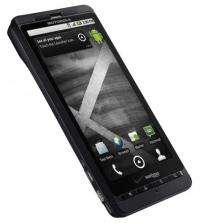Droid X takes the gloves off

For the last few years, the question with each launch of a new smart phone was: Is this the iPhone killer?
That no longer seems to be the right query. The competitive landscape of the mobile phone industry has produced not a single device capable of felling Apple's star gadget; rather, it is an operating system -- Google's Android platform -- that is challenging the iPhone's standing among smart phones.
"There's no one phone that will be an iPhone 'killer,' " said Shahid Khan, chairman and chief strategist at MediaMorph, who also noted that "kill" is too strong of a word. "It will be Android-based phones, all of them together ... (that Apple) will see a formidable competitor."
The latest entrant in the Android lineup was introduced Wednesday by Verizon Wireless, Motorola Inc. and Google, a day ahead of the highly anticipated iPhone 4 launch. The Droid X, which goes on sale at Verizon on July 15, has a 4.3-inch screen and a bevy of multimedia features, including an 8-megapixel camera and the ability to capture and play videos in high definition. Motorola's first Droid phone, released at Verizon late last year, had a 3.7-inch screen and a 5-megapixel camera.
The multimedia features in the Droid X speak to the growth in mobile video, whose spread is being enabled by faster networks, more powerful processors and bigger displays.
"The big differentiating feature (versus the original Droid) is the display and the capabilities that come along with that," Mark Shockley, Motorola's senior vice president who oversees global mobile phone sales, told the Chicago Tribune. "The whole notion of the home theater in your pocket is a big deal."
Verizon uses the Droid label for its line of premier Android-based smart phones. In addition to Motorola, Taiwanese handset manufacturer HTC also has two Droids at the carrier. And Verizon's Droid line is just a sampling of the Android devices on the market. Sprint, T-Mobile and AT&T all have Android products. Sprint's flagship device is the Evo, an Android phone by HTC.
"For consumers, if they're not interested in the iPhone experience for some reason or another, Android seems to be the default experience," said Avi Greengart, research director for consumer devices at Current Analysis.
Even with the growing number of Android-based rivals, the iPhone remains a mighty competitor.
First-quarter data from research firm IDC, which tracks mobile phone shipments by handset vendors, put Apple's share of the worldwide smart phone market at 16.1 percent, up from 10.9 percent in the same period of 2009. And Thursday's launch of the iPhone 4 is expected to be another huge event for Apple, which said preorders for the device outnumbered the previous version tenfold. Consumers who did not preorder the gadget will have to wait until Tuesday to buy it in AT&T stores.
Yet, data also show adoption of the Android platform is growing quickly, aided by a diverse lineup of devices at multiple carriers and an expanding number of third-party applications that can be loaded onto the phones. The NPD Group, a market research company, reported that Android is the No. 2 smart-phone operating system in the U.S. with a 28 percent share of the market, ahead of Apple's 21 percent. BlackBerry-maker Research In Motion is the leader, with 36 percent.
And the battle is far from over. Only 23 percent of mobile consumers in the U.S. have a smart phone, according to first-quarter data from The Nielsen Co. And companies such as Motorola are designing lower-priced smart phones. This means there's a lot of room for growth and continued competition among makers of smart phones.
"This is the largest opportunity in technology today and we're excited to be a part of it," Motorola co-Chief Executive Sanjay Jha said.
Gerry Purdy, managing director of research firm Mobiletrax, said the one-upmanship game among smart phone companies is beneficial for consumers.
"There's some exciting times ahead, and what's good about it is we have an environment where users are getting great value," he said. "They're getting more computing capability, more communication and more applications they can choose from."
(c) 2010, Chicago Tribune.
Distributed by McClatchy-Tribune Information Services.





















